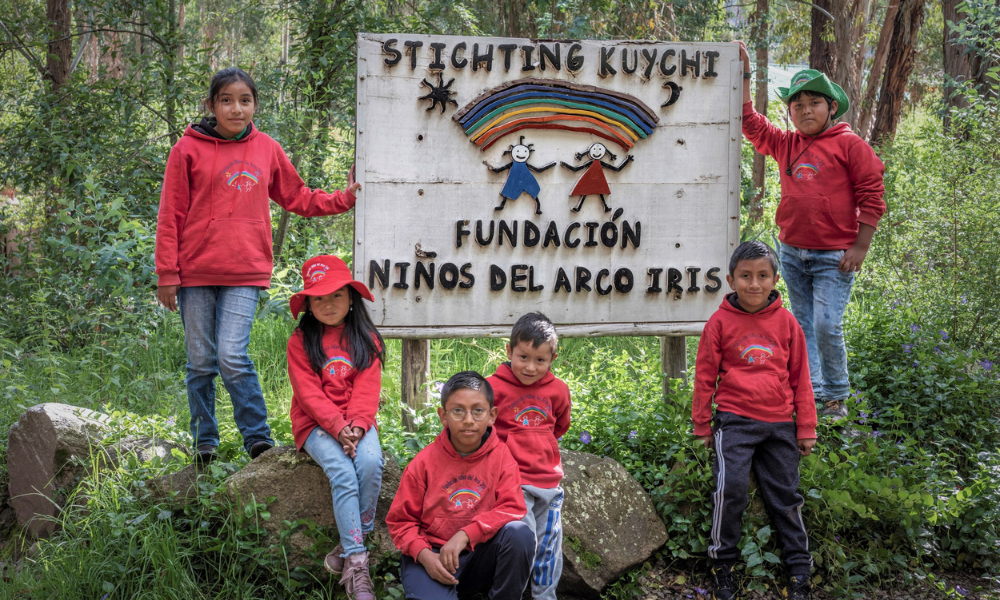Bringing Education and Wellness to the Children of Niños del Arco Iris.
When we heed divine callings, we can achieve more than we imagine and become true change agents. That is how the Niños del Arco Iris Foundation came to fruition 23 years ago. Today, the Foundation provides educational opportunities and health services to more than 200 children, from in-need families, each year.
Located in Urubamba, a city in Peru’s Sacred Valley, Niños del Arco Iris offers an integral education program for students ages 3 to 13, that includes English, Quechua, music, theater, technology and nutritional classes, among other standard materials.
The Foundation puts a large emphasis on the health and nutrition of its students, who receive healthy lunches and snacks every day at school. In addition, the Foundation ensures that the students are evaluated for anemia, malnutrition and obesity. The nonprofit also brings in medical professionals to conduct regular checkups, free immunizations, and to detect and treat parasites. It also brings in dentists for dental checkups and cleanings, and to hand out dental hygiene kits to the kids.
Through its efforts, the Niños del Arcoíris Foundation seeks to “form responsible citizens that are capable of contributing positive changes to society.”
To finance this great effort, the NGO has cabins to lodge tourists looking to explore the Sacred Valley, and 100 percent of the profits go to the Foundation. It also receives donations and volunteers.
We invite participants in and judges for the 2024 edition of the Luum Awards to join us for a one-day volunteer experience with Niños del Arco Iris, and to stay in their facilities. Can the global creative community contribute to the development of these future change agents?
Below, we share our interview with Alessandro Antonio del Campo Gaete, General Manager of the Niños del Arco Iris Foundation. We asked him about the Foundation’s self-described divine origins, about what sets it apart from other educational programs, and about its current needs, among other topics. This interview has been edited for brevity and clarity.
Luum: How did this organization begin?
Alessandro: Niños del Arco Iris was launched 23 years ago by its founder, Helena van Engelen, better known as Mamita Helena. And it started with a “calling” (as she likes to call it) that Helena felt when she was going through a difficult moment in her life.
As she recalls it, Helena saw a report on children in Lima and she was deeply touched by the needs of children in Peru. Then, on one of her trips through the Sacred Valley of the Incas, she lived a transformative experience that would inspire her to found Niños del Arco Iris. Helena says that while she was visiting the Plaza de Armas in Cuzco, a priest approached her and told her that she had a mission to carry out in Peru.
When Helena left the church, she came upon a group of children working, cleaning shoes. And just at that moment, the children began to shout, “Look up at the sky! Look at the sky!” When she looked up, she saw a rainbow, hence the name of the foundation, Niños del Arco Iris, Children of the Rainbow in English.
Luum: What sets Niños del Arco Iris apart from other educational programs?
Alessandro: At the Niños del Arco Iris Foundation, we offer children an integral program that doesn’t just provide them with a quality education, but also with nutrition and health services, which is directly correlated to the wellbeing of the children. And this is of vital importance, as the health of children directly influences their studies, as well as the development of other life skills. And it is thanks to these components, that the children are able to achieve all their goals and objectives more easily.
On the other hand, I would also like to emphasize the importance of offering children a healthy and safe environment. At the Foundation, the children receive love and protection from all the staff. And that allows the children to be truly children. That is, to live their childhood through learning and play without having to assume responsibilities that do not correspond to them, due to their age, that outside of the Foundation they surely would have to assume, due to their family and personal life circumstances.
Luum: Can you share a story that is representative of the children in the program?
Alessandro: The first story that comes to mind is that of Daniel. Dani is a boy that has been with us at the Foundation since he was very little. He is in sixth grade now. I highlight his story because it involves the whole family. They live in a town called Raqchi that is on the route to Chincheros, some 45-minutes away from the Foundation. And, for years, his family has demonstrated a strong commitment to Dani’s education, prioritizing him above all the obstacles and complications that are in the way. The boy takes a bus every day, by himself, to come to study at the Foundation.
It is a very beautiful story since it demonstrates the commitment of an entire family, especially the parents, who have proven that when you want to achieve something, you can. It is an example full of values. Dani’s older brother is already an engineer, and for that reason, Dani also wants to be one (in addition to a football player). Which shows that when you bet on education and love, great results can be achieved.
Luum: Where do the Foundation’s funds come from?
Alessandro: All the funds we receive come from our partners, most of them foreigners. And this reality leads me to reflect on this point. We need to make a conscious call to large Peruvian companies, so that together we can move forward in terms of national philanthropy. I believe that we have a great challenge ahead in this regard, in highlighting the importance of advancing together towards a new concept of unity and solidarity so that we can help build an increasingly just, equitable and prepared country.
Luum: What are your organization’s needs at this moment in time?
Alessandro: The first and primary need is always the same: the need for new people to join the project and invest in the comprehensive program that we offer.
We also face a great challenge at this moment, and that is to be able to modernize the education of the children and put ourselves at the forefront of everything that is happening today in the world with technology in order to prepare the students for the future.
We at Niños del Arco Iris are very committed to giving children a good education in the field of technology, and, being located in a rural area such as Urubamba, we are aware that we have a great challenge ahead of us in our efforts to prepare our children for the future, and really, the present.
And not only in terms of technological training, since at the Foundation we are very satisfied with our educational program, as it is designed to develop the competences of our students through projects that help them discover, put into practice, and perfect their capabilities to solve everyday challenges.
Luum: How could the creative community help meet these needs?
Alessandro: They could provide us with a guide as to what needs to be done so that more people can support this project. In other words, so that we can get more out of what we are doing. And this is because, often, when we are immersed in something, it is easy to lose perspective. And so, an outside perspective could help us become more aware of what we need to improve and how; and to help us see what our main strengths are, and how we can continue to guide them and direct them so as to secure new donors for the Foundation.
Luum: We know that Luum Awards participants (volunteers) are not going to change the world with a single day of volunteerism, but can they contribute something meaningful to the NGO by volunteering for a day? Or in the weeks following the experience?
Alessandro: Of course they can! From my experience at the Foundation, I can assure you that the experience the children have with a volunteer can change their life perspective, particularly when they meet a person who achieves something they never thought could be done.





